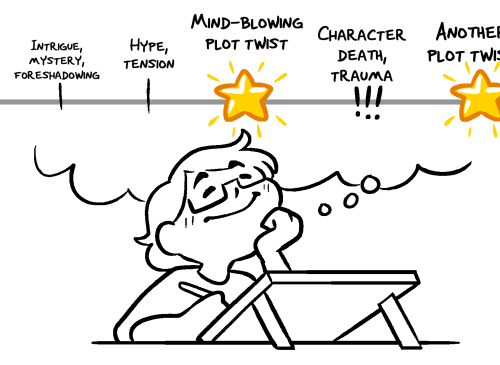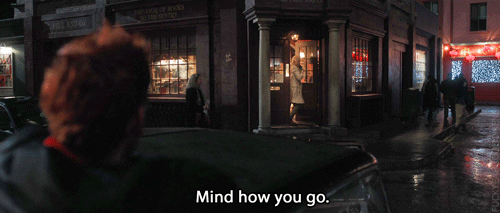How Did They Learn To Translate Languages Into Other Languages How Did They Know Which Words Meant What
how did they learn to translate languages into other languages how did they know which words meant what HOW DID TH
More Posts from Brushlesprouts and Others
did anybody else have a moment as a kid/teen where you suddenly realized that you were more than likely never going to have one of those big adventures that you read abt in YA novels. and u were going to just have a normal life with normal problems, and got real sad. and even tho u now see value in a regular life, part of you still wants magic powers and a rag tag group of ride-or-die friends who are out to save the world
but did victor frankenstein actually have a phd


Making long-form webcomics is like

Been in a funk lately. :/ So I’m experimenting with different techniques to try and get myself out of it.
overwatch thing
tag your most played hero for each class
offense, defense, tank, support
How I turned an idea into an outline
With NaNoWriMo around the corner, I thought I might show you how I plotted my novel.
This is the story structure I used:
0% inciting incident
0%-20% introduction in the world, ends with a point of no return
20% first plot point: the hero receives his marching orders
20%-50% response to the first plot point
35% first pinch point: reminder of the nature of the antagonistic force
50% midpoint: big fat plot twist that changes the hero’s AND reader’s experience
50%-80% attack: the stakes are higher now
65% second pinch point: again reminding the reader of the antagonistic forces at hand
80% second plot point: the final injection of new information into the story to give the hero everything she needs to become the primary catalyst in the story’s conclusion (no new information past this point)
80%-100% resolution + final conflict + return home

I didn’t make this up. I think it’s by Larry Brooks, if The Internet informs me correctly. Fun Fact: once you pay attention to it, you’ll see this structure everywhere. Just take a look at any Harry Potter book, for example.
These points are the “bones” of my story. Next, I decided what “flesh” to put on them.
I simply made a list of things I like to read about:
Books about books and libraries
Magic
Quirky characters
Intelligent, fast-paced and sometimes silly
So, I combined this list and the structure points into a story that makes sense. Because I don’t want to spoil my plot / I am still to shy about my wip, I will make up a new plot for this post, so I can show you.
0%: The hero does something magical without knowing how she did it. She discards it, because everybody knows it can’t have been real.
0%-20%: We see the daily life of the hero: she is unhappy because all she wants to do is read, but she is not allowed to. She reads in the dead of night and is punished for it by her evil stepcousin. She finds a book on magic.
20% It all clicks together: she can do magic!
20%-50% The daily life for the hero changes. Instead of reading all night, she practices magic. She now loves books even more. She has little victories over her evil stepcousin, but hasn’t won yet.
35% The evil stepcousin finds out that she can do magic and takes away the magic book.
50% She discovers she can do magic without the book.
50%-80% The hero is not the only one who is bullied by the evil stepcousin. Her younger cousin is a victim as well, and he doesn’t have magic to defend himself. The stakes are raised, this is bigger than herself now. The younger cousin also wants to read, so they have several bonding moments over reading.
65% The evil stepcousin hurts the younger cousin, he’s in a coma now.
80% The hero discovers the evil stepcousin could do all these evil things because he knows magic too.
80%-100% The hero confronts the evil stepcousin, fights him off, nearly loses but wins in the end. He gives up and releases his power over the younger cousin who wakes up from the coma.
It’s not the most genius plot ever, but I literally made this up in minutes. So can you! And imagine the genius plot you can come up with if you spend more than a few minutes on it.
Then I calculated how many scenes I need in which part of the story. My wip is a YA or 12+ book, so I want it to contain about 75,000 words in total. I want my scenes to be around 1,000 words long to keep it snappy, so I need 75 scenes.
Scene number 1 (0%) is the inciting incident, scene number 15 (20%) is the first plot point, scene number 26 (35%) is the first pinch point, scene number 37 (50%) is the midpoint, scene number 49 (65%) is the second pinch point, scene number 60 (80%) is the second plot point and scene 75 (100%) is the last scene.
Some sidenotes on the 1,000-word scenes:
That’s more of a vague rule of thumb than a strict rule. If your scene needs to be longer or shorter, make it longer or shorter of course. My wip has some 2,300-word scenes as well.
Having 1,000-word scenes does not mean I have 1,000-word chapters, that would be really short. I will divide my novel into chapters after I’m finished writing my first draft.
For NaNoWriMo, maybe you could write scenes of 1,667 words, so you do one scene per day. A 50,000-word novel has 30 scenes of 1,667 words. Inciting incident is at scene 1, first plot point at scene 6, first pinch point at scene 11, midpoint at scene 15, second pinch point at scene 20, second plot point at scene 24 and scene 30 is your last scene. That’s just an idea, you got to see what works for you.
Then I made up in one sentence what will happen in every scene. For example: “They meet the dragon and he sends them on a sidequest.” Now my outline consists of 75 one-sentence scenes. This way, I prevent the problem of the sagging middle and other pacing problems and I still get to surprise myself when writing.
From those one-sentence scenes, I flesh out every scene into a first draft, using the process I described in my post How I never have to face an empty page when I write.
And that’s my first draft! I hope everything is clear. Feel free to ask me questions if it isn’t.
I’m gonna tag a few people I admire, who I hope are interested. If you aren’t, feel free to ignore me, or message me to take you off my tag list. If you would like to be added to my writing advice tag list, let me know.
Keep reading






Fun fact: ‘Mind how you go’ is a Terry Pratchett reference. Not only his last book, The Shepherd’s Crown, has this dedication to one of the characters, it’s the Pratchett family’s mantra for safety:
Her [Rhianna Pratchett’s] parents were living in Wiltshire, while she was based in London but they saw a lot of each other and spoke constantly. “I’m always telling them I love them on the phone in a slightly silly way. We always say to each other, ‘Mind how you go’; it’s almost like a Pratchett mantra for safety.”
with Rhianna, the daughter of Terry Pratchett, saying this as her last words to her father and her grandfather.

Day 3 of arting. This character has taken me to researching the "Surgeon Barbers" of old. The sharpest razor in town for the cleanest cuts.





Another entry from the Stupid Dream Diary. I saved the dumbest for last: my affordable-healthcare-as-a-self-employed-person nightmare. ————————— Lackadaisy is on Patreon - there’s extra stuff!
-
 lostaccountsposts liked this · 2 weeks ago
lostaccountsposts liked this · 2 weeks ago -
 fpszombiequeen reblogged this · 2 weeks ago
fpszombiequeen reblogged this · 2 weeks ago -
 c0zy-drag0n liked this · 3 weeks ago
c0zy-drag0n liked this · 3 weeks ago -
 breneli0-asoiaf-lover liked this · 3 weeks ago
breneli0-asoiaf-lover liked this · 3 weeks ago -
 arternestkirkland reblogged this · 1 month ago
arternestkirkland reblogged this · 1 month ago -
 arternestkirkland liked this · 1 month ago
arternestkirkland liked this · 1 month ago -
 fivefancyarrows reblogged this · 1 month ago
fivefancyarrows reblogged this · 1 month ago -
 icy-ennui reblogged this · 1 month ago
icy-ennui reblogged this · 1 month ago -
 projectilecry liked this · 1 month ago
projectilecry liked this · 1 month ago -
 somewhere-in-a-microwave liked this · 1 month ago
somewhere-in-a-microwave liked this · 1 month ago -
 befriendthemurderfox reblogged this · 1 month ago
befriendthemurderfox reblogged this · 1 month ago -
 befriendthemurderfox liked this · 1 month ago
befriendthemurderfox liked this · 1 month ago -
 molly-bloom liked this · 1 month ago
molly-bloom liked this · 1 month ago -
 onyxlight liked this · 1 month ago
onyxlight liked this · 1 month ago -
 tictoxic liked this · 2 months ago
tictoxic liked this · 2 months ago -
 rollnsocks reblogged this · 2 months ago
rollnsocks reblogged this · 2 months ago -
 i-have-no-ideas reblogged this · 2 months ago
i-have-no-ideas reblogged this · 2 months ago -
 mentally-retired reblogged this · 2 months ago
mentally-retired reblogged this · 2 months ago -
 mentally-retired liked this · 2 months ago
mentally-retired liked this · 2 months ago -
 whoareyoueventhough reblogged this · 2 months ago
whoareyoueventhough reblogged this · 2 months ago -
 wormmutt liked this · 2 months ago
wormmutt liked this · 2 months ago -
 ghost-of-a-swarm-of-bees reblogged this · 2 months ago
ghost-of-a-swarm-of-bees reblogged this · 2 months ago -
 gremlinaut liked this · 2 months ago
gremlinaut liked this · 2 months ago -
 tangentbasedcreature liked this · 2 months ago
tangentbasedcreature liked this · 2 months ago -
 goblinofthelaboratory reblogged this · 2 months ago
goblinofthelaboratory reblogged this · 2 months ago -
 lartdumond reblogged this · 2 months ago
lartdumond reblogged this · 2 months ago -
 mybendystraw reblogged this · 2 months ago
mybendystraw reblogged this · 2 months ago -
 reraen reblogged this · 2 months ago
reraen reblogged this · 2 months ago -
 reraen liked this · 2 months ago
reraen liked this · 2 months ago -
 pyukumukun reblogged this · 2 months ago
pyukumukun reblogged this · 2 months ago -
 theapartmentcryptid reblogged this · 2 months ago
theapartmentcryptid reblogged this · 2 months ago -
 aggrus reblogged this · 3 months ago
aggrus reblogged this · 3 months ago -
 kuruising liked this · 3 months ago
kuruising liked this · 3 months ago -
 autokrates reblogged this · 3 months ago
autokrates reblogged this · 3 months ago -
 somnambulistsedge reblogged this · 3 months ago
somnambulistsedge reblogged this · 3 months ago -
 internmarce reblogged this · 3 months ago
internmarce reblogged this · 3 months ago -
 lisavijver reblogged this · 3 months ago
lisavijver reblogged this · 3 months ago -
 mini-and-mighty liked this · 3 months ago
mini-and-mighty liked this · 3 months ago -
 oregano-shipment liked this · 3 months ago
oregano-shipment liked this · 3 months ago -
 aeonicarchitect reblogged this · 3 months ago
aeonicarchitect reblogged this · 3 months ago -
 sootsprite19 liked this · 3 months ago
sootsprite19 liked this · 3 months ago -
 sleepydreameroncloud9 reblogged this · 3 months ago
sleepydreameroncloud9 reblogged this · 3 months ago -
 her-imperius-condessy reblogged this · 3 months ago
her-imperius-condessy reblogged this · 3 months ago -
 hiimhdere liked this · 4 months ago
hiimhdere liked this · 4 months ago -
 sunsetandstarlitsky reblogged this · 4 months ago
sunsetandstarlitsky reblogged this · 4 months ago -
 sleepydreameroncloud9 reblogged this · 4 months ago
sleepydreameroncloud9 reblogged this · 4 months ago -
 nat-without-a-g liked this · 4 months ago
nat-without-a-g liked this · 4 months ago -
 k9ok reblogged this · 4 months ago
k9ok reblogged this · 4 months ago -
 k9ok liked this · 4 months ago
k9ok liked this · 4 months ago